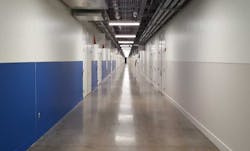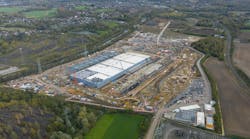UPDATE: On April 24, Prince William County’s proposed tax hike on data centers was officially defeated, failing by a 6-2 vote by the Board of Supervisors as part of a larger process to finalize the county budget for 2019.
A proposal to triple a key tax rate for data center operators in Prince William County appears headed for defeat, failing to gain the needed support from county supervisors.
During a meeting Tuesday night, four of the eight members of the Board of Supervisors expressed opposition to the tax hikes, saying an increase could derail the county’s efforts to attract data center investment. Five votes are necessary to approve the budget, which is slated to be approved at the board’s April 24 meeting.
Supervisor Corey Stewart, the board chairman, sought to increase the personal property tax rate for computer equipment and peripherals from $1.25 per $100 to $3.70. The $1.25 rate represented an incentive rate to attract technology businesses, while $3.70 is the rate paid by residents.
The proposal drew criticism from the business community, including the Northern Virginia Technology Council and Prince William Chamber of Commerce, as well as local data center operators. Some residents and supervisors supported the proposal, saying wealthy tech companies could afford to pay more.
The supervisors debated the pros and cons at Tuesday’s board meeting. Several supervisors advanced an alternate plan to have the county study the data center incentive rate as part of a larger study of the county’s tax rates. The board didn’t vote directly on Stewart’s proposal, but county officials will prepare a budget for next week’s vote that does not include the tax hike.
“I don’t have the support for it now,” Stewart said at the close of the meeting. In subsequent comments to local media, Stewart said he “doesn’t consider his proposal defeated just yet” because the budget is not final, hinting that he might seek additional discussion at the April 24 meeting.
‘Kicking A Cash Cow in the Teeth’
The tax hike proposal was floated by Stewart during the supervisors’ Feb. 28 budget session, hoping to offset a potential hike in county taxes and fees. Stewart said the move could raise an additional $20 million to support increased spending on education and public safety, but also allow the county to decrease the property tax rate.
The tax debate comes amid a boom in data center investment in Prince William, which has gained traction as the industry expands beyond “Data Center Alley” in nearby Loudoun County. Both counties are part of a cloud nexus in Northern Virginia, which is the world’s largest and most active data center market.
Supervisor Jeanine Lawson opposed the tax hike, noting that county tax revenue from the data center sector grew from $3.6 million in 2010 to $25.6 million in 2017, an increase of more than 600 percent.
“Why we would kick this cash cow in the teeth and chase them out of the county is beyond me,” said Lawson during the April 17 meeting.
Also opposing the proposal were supervisors Marty Nohe, Maureen Caddigan and Frank Principi.
“I think it would be foolish to make any increase in that rate,” said Nohe. “What we’ve heard from the president and the federal government is that cutting taxes on businesses would be rocket fuel for the economy, and create jobs and grow revenues. I want rocket fuel for Prince William County.[clickToTweet tweet=”Prince William Supervisor Frank Principi: We need to sit down and engage the data center industry about their tax rate. But we shouldn’t change it overnight.” quote=”Prince William Supervisor Frank Principi: We need to sit down and engage the data center industry about their tax rate. But we shouldn’t change it overnight.”]
“A tax increase would fly in the face of that,” Nohe continued. “If we tripled the tax rate, we would be sending a message to businesses that we don’t have a stable political culture or tax base.”
“We need to sit down and engage the data center industry about their tax rate,” said Principi. “But we shouldn’t change it overnight, and we shouldn’t triple it. This dialogue only started with the chairman’s surprise proposal to the board.”
Stewart: ‘They’re Not Going Anywhere’
Stewart argued that the incentive rate, which was designed to attract technology companies to Prince William, was never designed to be permanent. While acknowledging that the county used the favorable tax environment to court the data center industry, Stewart maintained that the arrangement was no longer equitable.
“The data center industry, which is crying poverty here today, is charged a third of what (residents) are charged,” said Stewart. “Who are the data centers? The biggest ones are Amazon, Microsoft, Google, Facebook and Apple – the wealthiest corporations on the planet. Business must pay their fare share.
“They’re not going anywhere,” Stewart added. “They’ve invested billions of dollars here. Those concrete buildings are not going to be lifted up and moved anywhere.”[clickToTweet tweet=”Supervisor Corey Stewart: Who are the data centers? They are the wealthiest corporations on the planet. Business must pay their fare share.” quote=”Supervisor Corey Stewart: Who are the data centers? They are the wealthiest corporations on the planet. Business must pay their fare share.”]
Supervisors Pete Candland and John Jenkins also supported increasing the tax rate on computer equipment.
“Residents have been subsidizing data centers over the past seven years by carving out (an incentive rate) for this special interest ,” Candland said. “The status quo isn’t working.”
Data Center Boom in the Balance
Prince William County is home to 31 data center projects and 3.5 million square feet of data center space, according to the county Department of Economic Development. In the past year, the county has welcomed several huge new data centers, including campuses for CloudHQ and Iron Mountain and additional sites for Amazon Web Services. Last month QTS Data Centers announced plans to build a 24-megawatt data center in Manassas.
The industry’s economic impact on Prince William County was highlighted in a recent report from the Northern Virginia Technology Council, which noted that although data centers aren’t massive job generators, they have positive impacts on the local economy.
In recent years, Prince William has actively marketed itself as a destination for data center development. In May 2016, the county created a Data Center Opportunity Zone Overlay District, aligning development with planning priorities and properties where supporting infrastructure is readily available or easily provided. The supervisors also approved an expedited review process for electrical substations required to support data center developments.
At the time, Stewart expressed support for the initiative, but his enthusiasm for the data center industry has clearly cooled following a long-running battle over a proposed power line to support the expansion of an Amazon Web Services campus in Haymarket. Dominion Virginia Power’s plan for an overhead 230kV line was opposed by a group of local residents, who have termed the project a “very expensive extension cord” for Amazon.
The dispute was recently settled, as Dominion agreed to bury three miles of the power line, while the Coalition to Protect Prince William County has agreed to end years of legal challenges to the project.
About the Author



